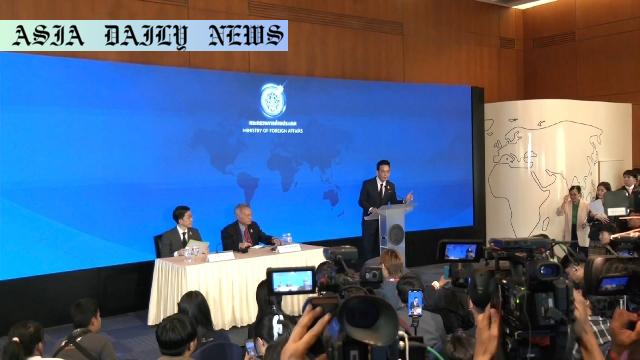Border Disputes: Cambodia seeks ICJ intervention after unresolved territorial tensions with Thailand led to a Tense escalation.
Cambodia has turned to the ICJ to solve its long-standing disputes with Thailand.
The decision follows clashes at the border, resulting in rising tensions.
Thailand expresses disappointment, urging for continued bilateral dialogue.
Cross-border cultural and economic exchanges have been restricted amidst the dispute.

Cambodia Escalates Border Dispute to International Court
The Kingdom of Cambodia has officially submitted its territorial dispute with neighboring Thailand to the International Court of Justice (ICJ), signaling a pivotal moment in the long-running border conflict. Cambodia’s move has been framed as the best pathway to peacefully resolving the friction, especially after bilateral negotiations have continuously failed to produce meaningful progress. This decision followed a deadly clash last month in one of the disputed areas, leaving a Cambodian soldier dead—highlighting the urgent and dangerous nature of the unresolved border issues.
Prime Minister Hun Manet announced the decision via social media, emphasizing Cambodia’s commitment to international mechanisms for upholding peace and justice. However, Thailand has expressed disappointment over Phnom Penh’s approach, describing it as premature and detrimental to ongoing bilateral dialogue. According to the Thai Foreign Ministry, diplomacy and direct negotiations remain the preferred path for resolving such sensitive issues. Both nations convened in Phnom Penh over the past weekend for talks, but no substantial agreement resulted from the discussions.
The Historical and Territorial Context
The border disputes between Cambodia and Thailand date back decades, revolving around contested border zones steeped in historical and cultural significance. A particularly charged focal point has been the Preah Vihear Temple area. This ancient Hindu temple site, a UNESCO World Heritage Site, has frequently been at the center of violent clashes and emotional nationalistic rhetoric in both countries. Despite repeated resolutions by international bodies, including a notable ICJ ruling in 1962, the details of the territorial demarcations remain heavily contested.
Experts argue that the disputes go beyond maps and treaties, involving questions of national identity, pride, and the struggle for military, political, and moral dominance. Both countries have historically leveraged the issue to rally domestic support, making compromise politically sensitive. Recent clashes further underscore how volatile the situation remains. Amidst shots fired and soldiers injured or lives lost, it becomes evident why third-party arbitration may be necessary to prevent further escalation.
Broader Implications for Bilateral Relations
The implications of choosing the ICJ route are multifaceted, impacting not only bilateral relations but also trade, cultural ties, and regional diplomacy in Southeast Asia. Cross-border exchanges have already suffered visibly due to the ongoing tensions. Cambodia has banned Thai movie screenings and broadcasts on its territory, illustrating how political disputes can spill into cultural domains. Simultaneously, Thailand tightened restrictions on several key border crossings in an apparent retaliatory move.
As ASEAN members, both nations share significant obligations toward fostering integration and peaceful coexistence within the region. However, this dispute, if left unchecked, may set troubling precedents for resolving complex sovereignty issues. The recurring escalation demonstrates the limits of intra-ASEAN mechanisms for handling territorial disagreements, sparking debates about strengthening multilateral dispute-resolution frameworks across the region.
Looking Ahead: Challenges and Hope for Resolution
Engaging the ICJ is a bold and symbolic step by Hun Manet’s administration toward achieving a peaceful resolution. However, the success of this legal approach hinges on Thailand’s willingness to engage constructively. While the ICJ can issue binding rulings, their enforcement requires the cooperation of sovereign nations, creating a complex equation for effective resolution. Moreover, the legal proceedings may take years, leaving uncertainties across the contested regions, impacting residents, tourism, and economic opportunities.
The coming months will be critical as the world watches how these two ASEAN neighbors manage this high-stakes diplomatic and legal gambit. Hopefully, this international intervention represents a turning point toward resolving a deeply entrenched issue while preventing further loss of life and social division.



Commentary
A Complex Chronicle of Border Rivalry
The Cambodia-Thailand border dispute is an enduring and emotionally charged issue that illustrates the challenges of reconciling historical grievances with modern-day diplomacy. From the contest over the Preah Vihear Temple to broader territorial disagreements, the issue serves as a microcosm of how history continues to shape and sometimes disrupt international relations.
What is particularly striking about this situation is the human dimension. The people residing in these border areas often become collateral victims of unresolved disputes, experiencing heightened militarization and periodic violence. For them, national pride or legal titles mean little when their livelihoods are perpetually disrupted. Elevating the issue to the ICJ could potentially spark hope among these communities, especially if it fosters a long-term, peaceful resolution.
Opportunities in International Mediation
Cambodia’s decision to approach the ICJ can be seen as a pragmatic move in leveraging international mechanisms to ensure justice, especially when regional options through ASEAN proved inadequate. However, the step has not been without criticism, and Thailand’s disappointment is understandable, given the sensitive nature of any external involvement in sovereignty issues.
Despite this friction, international mediation could set a precedent for peacefully resolving not only this matter but also other sovereignty-linked disputes in the region. Cambodia’s ICJ appeal must be viewed not as antagonistic but as a calibrated effort to achieve justice, enforce rule-based systems, and preserve regional peace.
Hope for Reconciliation Amid Challenges
Ultimately, disputes such as these remind us that peace and justice do not come easily; they require patience, strategy, and, above all, dialogue. While submitting the matter to an international court shows Cambodia’s eagerness to find resolution, this move must be supported by genuine cooperation from Thailand to ensure the effort bears fruit.
My hope is that both nations will seize this moment not only to resolve the territorial disagreement but also to reflect on how cooperation, rather than conflict, can better serve regional interests. Issues like these are never simply one country’s problem; they ripple across entire regions, challenging the foundations of peace and reminding us of the perpetual labor required to sustain it.